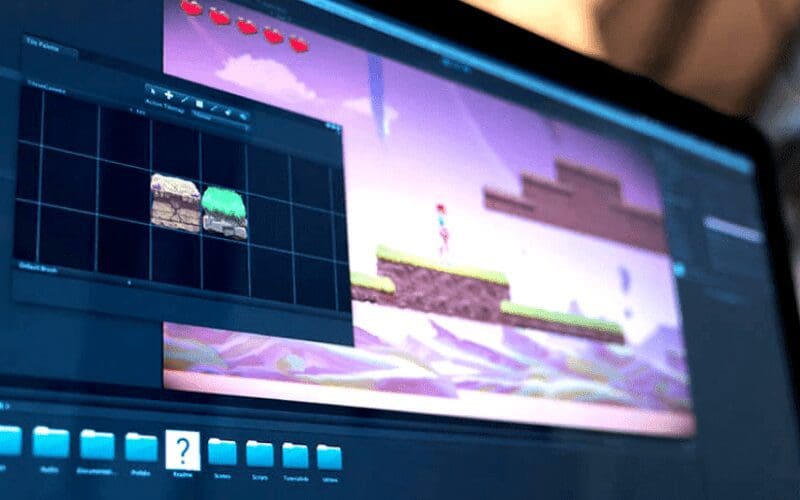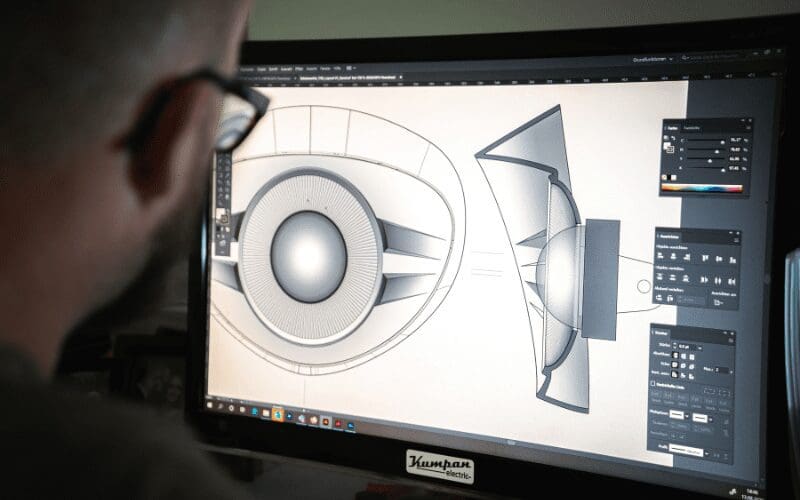Many of us grow up playing games. Whether you are a PlayStation patron or devoted to the Xbox, we are all united in our enthusiasm for gaming. But, what if rather than simply playing these games, you wanted to become the creator? Maybe you are interested in game design software or the art of game design. These creators are more professionally known as video game designers, which is what we will be guiding you through in this article.
We will explore what exactly a game designer does. As well as what you need to become a game designer, the opportunities available to you, and where you might begin your search.
First things first, however, you need passion. A passion for gaming. For game design. For revelling in the delight of others who listen to the stories you create. If you are passionate about these things, then this article may be of benefit to you. So let’s begin!
What Is Game Design?

Game design is exactly that: the designing of video games. It is a complex and layered process with many aspects to consider. Including target audience, desired reception, and deadlines.
Deadlines are particularly crucial for big franchises such as Metal Gear Solid and The Legend of Zelda, a distinctly pressing matter at the moment. Who else is eagerly awaiting news of the Breath of the Wild sequel?
What Is A Game Designer?

The term ‘video game designer’ is an umbrella term. More generally, it covers artists, storytellers, programmers, and creatives.
Game designers are autonomous gods with total control over the characters, storyline, and genre of a game. As well as the target audience.
These are considered the core features of any game. Along with secondary features including length, aesthetic and stylistic details. Of which enhance the engagement levels of prospective gamers.
What Does A Game Designer Do?

You might be wondering, in reality, what does a game designer do?
As we mentioned before, a game designer is not just a designer in the technical sense of game creation. They must harbour some level of artistic creativity in order to be able to visualise and bring to life what they imagine.
This does not mean you need to be the next Vincent Van Gogh or Banksy. But, putting a pen to paper should be something you are comfortable with. After all, gaming is a form of escapism. It is a chance for us to visualise and explore alternate worlds and experiment with different bodies, mindsets and skill sets not readily available in the real world.
The Core Elements Of A Game
A video game designer is responsible for the core elements of a game including plot, storyline, characters and character development. These go hand-in-hand with each other and often depend on the genre chosen for the game.
Game designers nowadays require the intuition to create a main or several main characters that are interesting to players. Whether short and niche or a long-term commitment, games require a captivating character worthy of our money, time, and emotions.
Likewise, the success of a game relies on an intriguing plot with some, if not all, of the following traits. Varied stages of success and failure, level progression, discovery and expansion, rewards systems, upgrades as well as downloadable content (DLC) and modifications (mods).
A game designer is also responsible for outlining the user interface. Which includes map design and layout, home and pause screen, and animations for rewards or upgrades.
Game Testing
A game designer is also responsible for testing their game at various stages.
This ensures that there are no glitches or plot holes, sensible dialogue and script, and overall clarity throughout.
After all, several small mistakes spotted at an early stage are far more manageable than a few significant ones mere days away from the game’s release date.
How To Become A Video Game Designer

There are a few ways to become a video game designer. Whether it’s freelancing in your bedroom, obtaining a game design degree or scoring a once-in-a-lifetime game design internship with a big shot company like EA or Sony, all require ambition, dedication and hard-work.
If you still have the opportunity to choose your school subjects, mathematics, and other computer-related subjects can be of benefit to you for game design courses. With regard to navigating the programming and IT elements of game design.
However, there are usually no specific requirements other than the completion of secondary-level education. Make sure to consult the section on course requirements when applying, just in case.
Do You Need A Game Design Degree?

Colleges and universities around the globe offer many different courses that can lead directly to a career in video game design. They can act as a segway into the game design industry or lead the way to further education.
Specific game design schools or colleges might offer courses with subjects such as 3D modelling and animation, narrative design and software development.
Prospective game designers will learn how to understand gaming concepts and how to effectively express their intentions with regard to the story, the artistic elements of the game, and which group or groups their game will be intended for. They will also learn how to storyboard a game. Meaning they will physically map out the game concept on boards to produce a story in order to visualize it overall.
Additionally, they will learn how to use game design software. Whether you’re applying for game design courses or you’re taking a DIY approach, take note of the following software platforms. Some of these are free to download and a great way to get started: GameMaker Studio 2, Unity 3D, Unreal Engine 4, Construct 3, Godot Engine, Blender, and Stencyl.
These are among the most popular game design software platforms. But not the only ones, so make sure to do your research and discover which works best for you. Make sure to include in your research which software is most compatible with PC or Mac depending on what device you have. There are plenty of opportunities for freelance or DIY game designers to experience these software platforms also as many offer free trials or deals.
How To Become A Game Designer Without Qualifications

So what if formal education isn’t what you’re looking for? Maybe you’ve decided upon a career change but would rather not return to university. Or, maybe you can’t attend university for some reason, and that’s okay!
There are still plenty of opportunities for an aspiring video game designer, so let’s discuss.
Entry Level Game Design Jobs

Firstly, you could apply for the role of a game tester. These positions are often classified as entry-level game design jobs meaning there may be no formal or third-level education required.
An interest in gaming or software would be looked on favorably though. In this role, you would be helping companies work through bugs or glitches in their games. If you stick to it, it might lead to a more significant role in the company.
For these types of game design jobs, it is wise to tailor your resumé or CV to suit the needs of the company. This means highlighting your interest in gaming, specific genres of gaming you favor, any previous experience relevant to the role, and desirable skills.
They might ask for someone with good interpersonal and communication skills, creativity and storytelling, critical thinking, programming knowledge, or general knowledge of multimedia platforms and game design software.
Build A Portfolio

If you would rather strive toward a game design career straight away, there are a few things you should keep in mind when applying to gaming companies or going freelance. Both require a game design portfolio to showcase your skills as an amateur and ensure your understanding of the process of game design.
This portfolio can be compiled of anything you have designed or begun work on, a project you’ve been a part of or something you have created in its entirety. Small or big projects, jot them down. Don’t underestimate yourself. If anything, overestimate yourself!
Ambition is an attractive quality to any company seeking amateurs to invest their time and money in. If you have an interest in a specific genre or niche element of gaming, make sure to highlight this.
Once begun, your portfolio will be ever-evolving, something you will add to throughout your professional life, and something to be proud of. So make sure to get on that now if you haven’t already!
Internships

Once you have a portfolio set up, you might consider a game design internship. Some companies offer internships, paid and unpaid, and can even lead to a permanent position with the company afterward.
If not, it’s an excellent experience and looks brilliant on your resumé when pursuing your game design career elsewhere. They are usually a full-time commitment and range from 3 to 6 months or a year-long period.
During this time, you might be asked to review and test games at different stages of the game design process, express any issues discovered, or offer creative and practical solutions. This is an opportunity to showcase initiative and a genuine interest in the subject matter.
You might be asked to keep track of the paperwork and documentation, taking on some administrative-type duties. You might even be given the opportunity to create new content like game characters, questlines, in-game items, or location names that will be included in the final product.
Game Designer Salary

A game designer’s salary can also depend on the company you are working for. For example, a globally recognized company like Sony or Ubisoft might offer a higher salary than a start-up company located solely in the UK. Likewise, the salary of a job that requires a university degree might differ from that which does not have those requirements.
Typically, entry-level game design jobs pay £17,000 to £18,000, a low enough starting rate but these jobs should not be dismissed. It might be the kick-start you have been searching for. Game testers can earn slightly more, ranging from £18,000 to £22,000 as they might be given more responsibility from the get-go.
Some companies offer competitive salary rates meaning they offer the same or similar salaries offered by other companies in the industry. They are often open to negotiation. So make sure you are prepared when going into an interview. Being aware of the standard pay for the job you’re applying for can be handy so that you’ll know what to expect from the role. Additionally, you’ll be wise as to whether they are trying to swindle you with a lower rate than you are worth.
Where To Find Game Design Jobs

Searching for game design jobs can be daunting at first, particularly if you don’t know where to start. Here’s a few tips.
If you haven’t made a LinkedIn profile yet, this is a sign to do it now. When you finish reading this article, download the app or head to LinkedIn.com. Set up a profile with all your educational and professional experience (which can include any freelance or solo projects), skills, expertise, and any certificates you’ve received from courses you’ve done.
LinkedIn is fast becoming one of the most popular social media sites for professionals and aspiring professionals. There are always new job postings including those within the game design industry. Seek and you shall find.
If you don’t see anything you are interested in or qualified for, you can turn on a notification system that notifies you when similar jobs come up. This is handier than checking the app every day. Another site worthy of inspection is Indeed. You don’t need to set up a profile for this one, just have an up-to-date resumé to hand.
If you are really eager to work for a certain company, it’s worth checking up on their website to see if they have any career openings. Some companies avoid sites like LinkedIn and Indeed as they might be looking for specific candidates or those with the initiative to pursue a career directly with them.
It shows ambition and enthusiasm when you seek out a specific person to work for. Even now, Careers at Sony are searching for a data analyst and a computer graphics researcher, and offering an administration internship, to name a few. Definitely worth a look. Keep an eye out for opportunities posted on their Facebook, Twitter, and Instagram profiles too.
Our Final Thoughts

So there you have it, a simple guide on what is game design and how to become a video game designer. Hopefully, we have given you the information you need to begin your pursuit of a career in game design.
Whether you want a game design degree or want to go freelance and download a few software platforms, now is as good a time as any to start. It is a tough but rewarding industry that is constantly in demand for new and intriguing storylines and characters. Audiences always want more and opportunities are constantly opening up for aspiring game designers to prove themselves.
Have a game you want to play? Get it out there! Ask your friends, family, co-workers, peers, or anyone who is willing to, well, play more games. Continue to build on your skills and confidence. Who knows, a few years down the line you could be the next Hideo Kojima (Metal Gear Solid) or Satoshi Tajiri (Pokémon).



